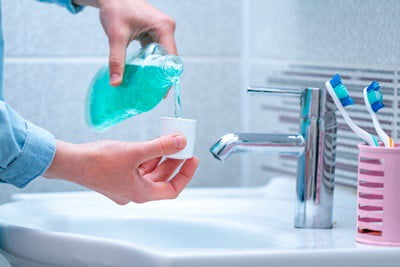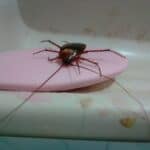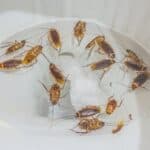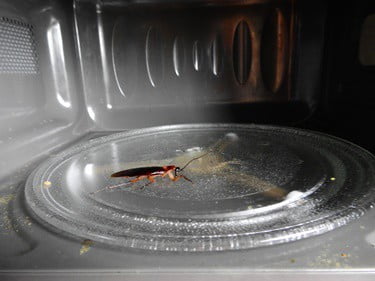Cockroaches are a nuisance, but pesticides and chemical-based repellents are problematic because of the side effects. That’s why you might want to consider natural pest control methods instead, such as mouthwash.
Not all mouthwash is strong enough to kill cockroaches, but Listerine might be if you spray it directly onto any roach you see. It contains four essential oils, including eucalyptol, menthol, methyl salicylate, and thymol, that work together to kill bacteria. Specifically, eucalyptol is toxic in high doses. You can also make a simple roach repellent solution using mouthwash, water, and dishwasher soap.
The pungent minty smell should be enough to keep cockroaches away, even if mouthwash doesn’t kill them directly. You’ll need to spray it frequently around your home for it to work, though, and you will have to use other pest control methods alongside it for it to work effectively.
Can You Use Mouthwash To Get Rid Of Roaches?
Cockroaches are one of the most unpleasant pests facing human environments. They’re not only unsanitary, but they carry and spread harmful disease-causing bacteria, such as:
- Salmonella
- Staphylococcus
- Streptococcus
That’s why you should aim to keep cockroaches out of your home before they infest your environment. If you’re looking for a natural pest control method, it might surprise you to find out that mouthwash is a good option.
Cockroaches hate the smell of peppermint, alongside other oils in the mint family, so spraying mouthwash around your home can deter them from moving in and setting up their colony in your home. It can also drive them out of your home. The benefit of using mouthwash as a pest control method is that it’s:
- Safe for pets and small children
- Free from dangerous chemicals
- Cheap and easy to buy
To create an effective cockroach repellent made with mouthwash:
- Mix equal parts mouthwash with water in a clean spray bottle and add a few drops of washing up liquid.
- Give the bottle a shake and spray it liberally around the house.
- You can also spray the solution directly at furniture where cockroaches may be lurking.
- Repeat every 2-4 hours until you stop seeing cockroaches in the vicinity.
Another method is to use mouthwash alongside peppermint oil. To do this:
- Add five drops of peppermint oil to half a cup of mouthwash.
- Pour it into a spray bottle.
- Add two cups of water and stir or shake the solution well.
- Spray the solution where cockroaches are more likely to be lurking, spritzing it in all rooms of your home.
If you spray the solution directly at cockroaches, you may even be able to kill them.
Does Listerine Kill Cockroaches?
Listerine is an antiseptic mouthwash brand that’s designed to destroy bacteria. This means it can kill cockroaches upon direct contact. The reason it does this is that it contains essential oils that are harmful to cockroaches, which are:
- Eucalyptol
- Menthol
- Methyl salicylate
- Thymol
In particular, eucalyptol, the primary ingredient in Listerine, is commonly used in insect repellent products. It’s found in tea tree and is toxic in large doses.
That’s not the only benefit of using Listerine against cockroaches. According to the Journal of Dental Hygiene, antimicrobial mouth rinse penetrates bacterial cell membranes, killing them. The same can be said for cockroaches.
The Journal of Agriculture and Urban Entomology explains how mint oil is toxic to German cockroaches and American cockroaches, giving Listerine roach-killing qualities.
You can also add Listerine to hairspray to kill cockroaches. The spray is sticky, so spraying it directly at a roach seals their breathing orifices, suffocating them to death. Hair spray is water-soluble, so you can wipe it off surfaces using a damp cloth without causing damage to your surfaces or furniture.

Does Listerine Repel Roaches?
Thanks to the essential oils, Listerine is one of the best mouthwash brands for repelling cockroaches. Cockroaches hate the smell of mint, so they’ll stay well away regardless of which minty Listerine mouthwash variety you choose.
Be sure to dilute the mouthwash down first, or you’ll end up with sticky surfaces. If you don’t want to spray mouthwash around your home, leave a cup or shallow dish containing Listerine around various corners of your home. The pungent smell should be enough to keep cockroaches away.
That being said, you’ll likely find that using Listerine alone won’t be enough to deter cockroaches forever. Over time, cockroaches may get used to the smell. Similarly, if they’re hungry or thirsty enough, they’ll ignore the scent in the pursuit of the resources they need to stay alive. Then there’s the chance that the mouthwash scent will fade, becoming ineffective.
Instead, why not consider using other natural repellents to create an unpleasant environment for the pests? As well as the minty smell of mouthwash, cockroaches are repelled by:
- Catnip
- Cinnamon
- Garlic
- Coffee grounds
- Citrus
They also hate the smell of the following essential oils:
- Lavender
- Tea tree
- Eucalyptus
- Peppermint
- Citronella
Using these things simultaneously is more likely to keep cockroaches away more effectively, working together to create the most unpleasant environment possible for the pests.
Can Toothpaste Kill Cockroaches?
Now that you know mouthwash is effective against cockroaches, you might be wondering whether toothpaste is too. Most homes have at least one tube of toothpaste in the bathroom cabinet, making them a readily available and cheap method of pest control.
Some kinds of toothpaste contain borax, which is used as a cleaning agent to whiten teeth. It’s made from the same chemical compound as boric acid – a common cockroach pesticide. That’s why humans, particularly young children, shouldn’t swallow toothpaste when we brush our teeth.
For toothpaste to kill cockroaches, they must eat it. Borax doesn’t attract roaches, so it’s commonly used in baits containing food they can’t resist. Once one cockroach eats the solution, it returns to its colony to die. When it does, the other cockroaches eat the body, consuming the toxic borax and also dying.
Because toothpaste is so minty, cockroaches are unlikely to eat it. However, you can try your luck with fruity toothpaste containing borax, which roaches are more likely to consume. That being said, if they’re hungry enough, they’ll eat anything – even minty toothpaste.
Does Toothpaste Repel Cockroaches?
Toothpaste is likely more effective as a cockroach repellent. Place a pea-sized amount of toothpaste wherever your cockroaches are likely to hang out to keep them away. If they end up eating it – even better, as it may kill them.
While mouthwash may be an effective roach repellent that sometimes kills cockroaches, dealing with an infestation is usually more complex than spraying a mouthwash solution around your home. That’s why it’s best as a supplementary treatment alongside other pest control methods.




